Report: Blockchain Technology and its Social and Economic Impacts
VerifiedAdded on 2023/04/22
|6
|1479
|436
Report
AI Summary
This report provides an in-depth analysis of blockchain technology and its wide-ranging social impacts. It explores how blockchain, a decentralized digital technology, is transforming various sectors, including finance, agriculture, and governance. The report highlights the impact of Bitcoin and digital wallets on financial services, especially for those without access to traditional banking, and the role of blockchain in facilitating micropayments and microloans. It also examines the use of blockchain in agriculture to improve transparency and efficiency, and in the context of smart contracts to enhance trust and reduce corruption. Furthermore, the report discusses the implications of blockchain for the Internet of Things, electoral processes, data security, and crowdfunding. The paper concludes by emphasizing the potential of blockchain to reshape traditional business models and foster social change by promoting sharing over ownership.
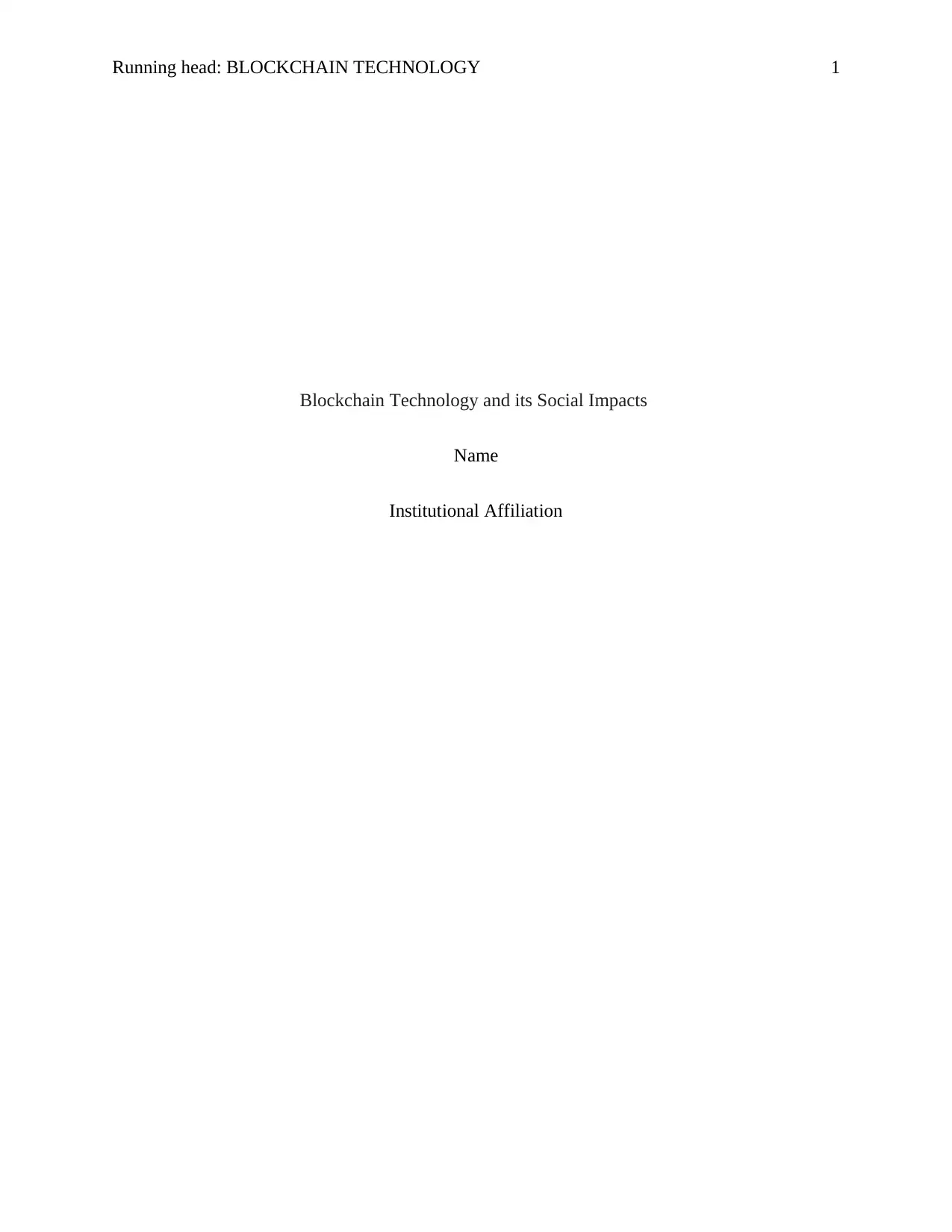
Running head: BLOCKCHAIN TECHNOLOGY 1
Blockchain Technology and its Social Impacts
Name
Institutional Affiliation
Blockchain Technology and its Social Impacts
Name
Institutional Affiliation
Paraphrase This Document
Need a fresh take? Get an instant paraphrase of this document with our AI Paraphraser
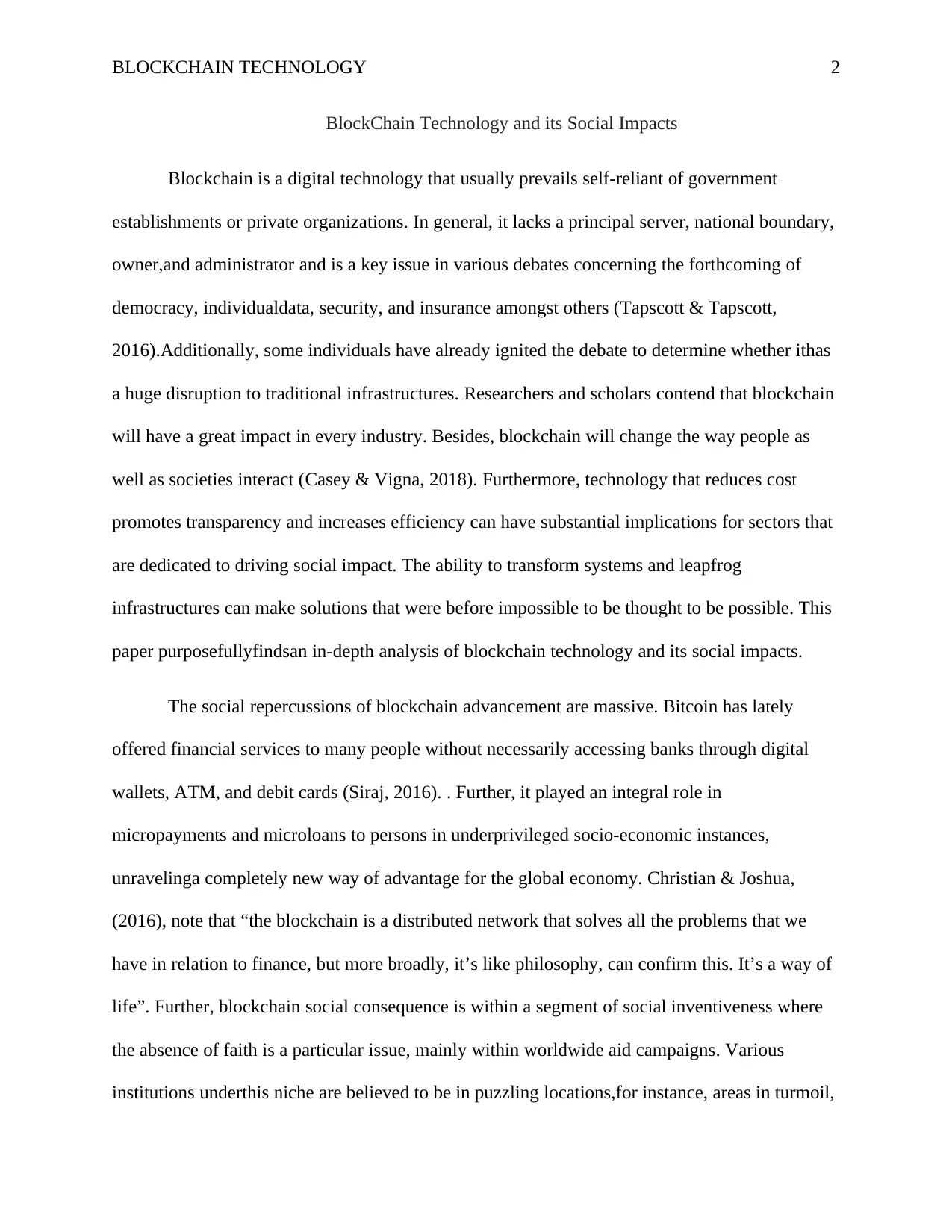
BLOCKCHAIN TECHNOLOGY 2
BlockChain Technology and its Social Impacts
Blockchain is a digital technology that usually prevails self-reliant of government
establishments or private organizations. In general, it lacks a principal server, national boundary,
owner,and administrator and is a key issue in various debates concerning the forthcoming of
democracy, individualdata, security, and insurance amongst others (Tapscott & Tapscott,
2016).Additionally, some individuals have already ignited the debate to determine whether ithas
a huge disruption to traditional infrastructures. Researchers and scholars contend that blockchain
will have a great impact in every industry. Besides, blockchain will change the way people as
well as societies interact (Casey & Vigna, 2018). Furthermore, technology that reduces cost
promotes transparency and increases efficiency can have substantial implications for sectors that
are dedicated to driving social impact. The ability to transform systems and leapfrog
infrastructures can make solutions that were before impossible to be thought to be possible. This
paper purposefullyfindsan in-depth analysis of blockchain technology and its social impacts.
The social repercussions of blockchain advancement are massive. Bitcoin has lately
offered financial services to many people without necessarily accessing banks through digital
wallets, ATM, and debit cards (Siraj, 2016). . Further, it played an integral role in
micropayments and microloans to persons in underprivileged socio-economic instances,
unravelinga completely new way of advantage for the global economy. Christian & Joshua,
(2016), note that “the blockchain is a distributed network that solves all the problems that we
have in relation to finance, but more broadly, it’s like philosophy, can confirm this. It’s a way of
life”. Further, blockchain social consequence is within a segment of social inventiveness where
the absence of faith is a particular issue, mainly within worldwide aid campaigns. Various
institutions underthis niche are believed to be in puzzling locations,for instance, areas in turmoil,
BlockChain Technology and its Social Impacts
Blockchain is a digital technology that usually prevails self-reliant of government
establishments or private organizations. In general, it lacks a principal server, national boundary,
owner,and administrator and is a key issue in various debates concerning the forthcoming of
democracy, individualdata, security, and insurance amongst others (Tapscott & Tapscott,
2016).Additionally, some individuals have already ignited the debate to determine whether ithas
a huge disruption to traditional infrastructures. Researchers and scholars contend that blockchain
will have a great impact in every industry. Besides, blockchain will change the way people as
well as societies interact (Casey & Vigna, 2018). Furthermore, technology that reduces cost
promotes transparency and increases efficiency can have substantial implications for sectors that
are dedicated to driving social impact. The ability to transform systems and leapfrog
infrastructures can make solutions that were before impossible to be thought to be possible. This
paper purposefullyfindsan in-depth analysis of blockchain technology and its social impacts.
The social repercussions of blockchain advancement are massive. Bitcoin has lately
offered financial services to many people without necessarily accessing banks through digital
wallets, ATM, and debit cards (Siraj, 2016). . Further, it played an integral role in
micropayments and microloans to persons in underprivileged socio-economic instances,
unravelinga completely new way of advantage for the global economy. Christian & Joshua,
(2016), note that “the blockchain is a distributed network that solves all the problems that we
have in relation to finance, but more broadly, it’s like philosophy, can confirm this. It’s a way of
life”. Further, blockchain social consequence is within a segment of social inventiveness where
the absence of faith is a particular issue, mainly within worldwide aid campaigns. Various
institutions underthis niche are believed to be in puzzling locations,for instance, areas in turmoil,
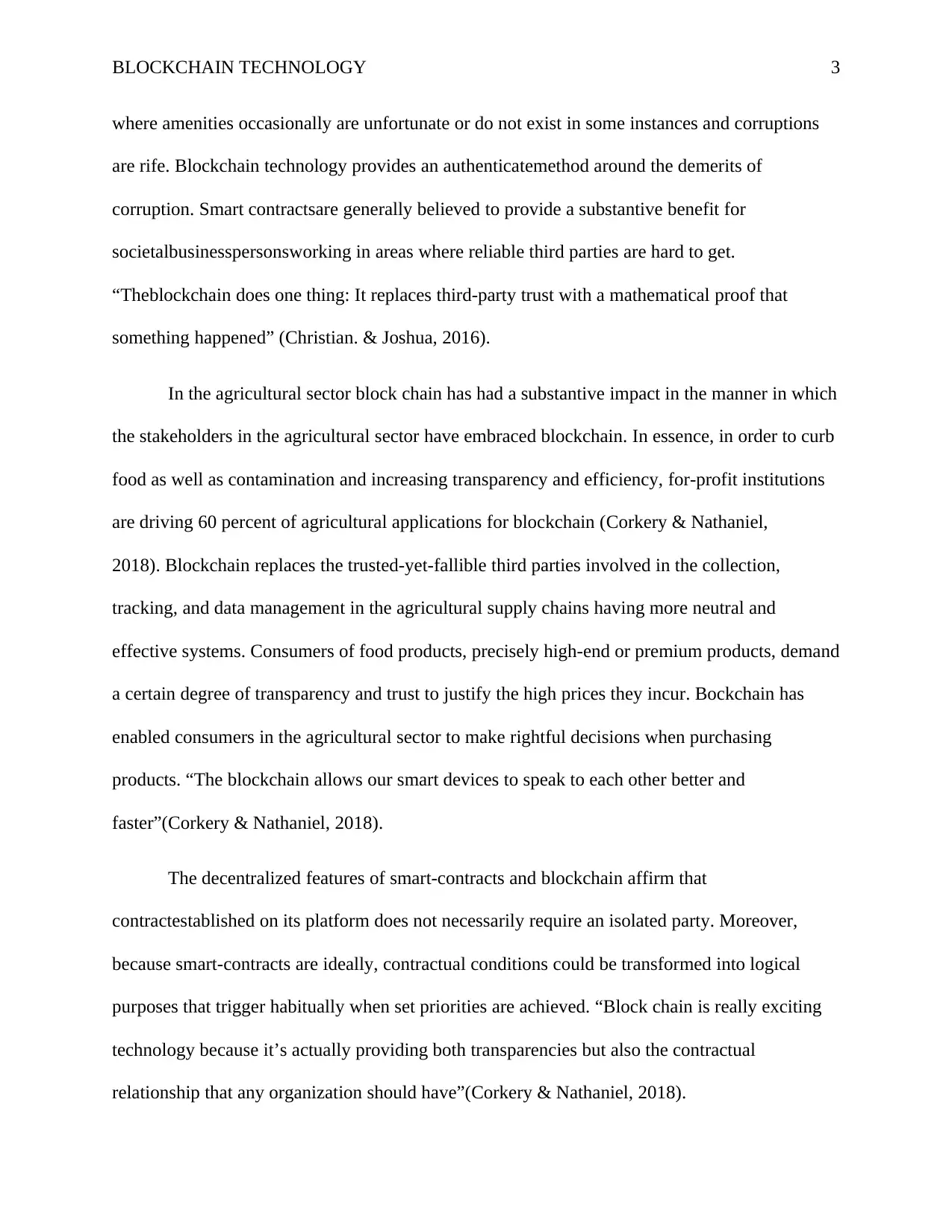
BLOCKCHAIN TECHNOLOGY 3
where amenities occasionally are unfortunate or do not exist in some instances and corruptions
are rife. Blockchain technology provides an authenticatemethod around the demerits of
corruption. Smart contractsare generally believed to provide a substantive benefit for
societalbusinesspersonsworking in areas where reliable third parties are hard to get.
“Theblockchain does one thing: It replaces third-party trust with a mathematical proof that
something happened” (Christian. & Joshua, 2016).
In the agricultural sector block chain has had a substantive impact in the manner in which
the stakeholders in the agricultural sector have embraced blockchain. In essence, in order to curb
food as well as contamination and increasing transparency and efficiency, for-profit institutions
are driving 60 percent of agricultural applications for blockchain (Corkery & Nathaniel,
2018). Blockchain replaces the trusted-yet-fallible third parties involved in the collection,
tracking, and data management in the agricultural supply chains having more neutral and
effective systems. Consumers of food products, precisely high-end or premium products, demand
a certain degree of transparency and trust to justify the high prices they incur. Bockchain has
enabled consumers in the agricultural sector to make rightful decisions when purchasing
products. “The blockchain allows our smart devices to speak to each other better and
faster”(Corkery & Nathaniel, 2018).
The decentralized features of smart-contracts and blockchain affirm that
contractestablished on its platform does not necessarily require an isolated party. Moreover,
because smart-contracts are ideally, contractual conditions could be transformed into logical
purposes that trigger habitually when set priorities are achieved. “Block chain is really exciting
technology because it’s actually providing both transparencies but also the contractual
relationship that any organization should have”(Corkery & Nathaniel, 2018).
where amenities occasionally are unfortunate or do not exist in some instances and corruptions
are rife. Blockchain technology provides an authenticatemethod around the demerits of
corruption. Smart contractsare generally believed to provide a substantive benefit for
societalbusinesspersonsworking in areas where reliable third parties are hard to get.
“Theblockchain does one thing: It replaces third-party trust with a mathematical proof that
something happened” (Christian. & Joshua, 2016).
In the agricultural sector block chain has had a substantive impact in the manner in which
the stakeholders in the agricultural sector have embraced blockchain. In essence, in order to curb
food as well as contamination and increasing transparency and efficiency, for-profit institutions
are driving 60 percent of agricultural applications for blockchain (Corkery & Nathaniel,
2018). Blockchain replaces the trusted-yet-fallible third parties involved in the collection,
tracking, and data management in the agricultural supply chains having more neutral and
effective systems. Consumers of food products, precisely high-end or premium products, demand
a certain degree of transparency and trust to justify the high prices they incur. Bockchain has
enabled consumers in the agricultural sector to make rightful decisions when purchasing
products. “The blockchain allows our smart devices to speak to each other better and
faster”(Corkery & Nathaniel, 2018).
The decentralized features of smart-contracts and blockchain affirm that
contractestablished on its platform does not necessarily require an isolated party. Moreover,
because smart-contracts are ideally, contractual conditions could be transformed into logical
purposes that trigger habitually when set priorities are achieved. “Block chain is really exciting
technology because it’s actually providing both transparencies but also the contractual
relationship that any organization should have”(Corkery & Nathaniel, 2018).
⊘ This is a preview!⊘
Do you want full access?
Subscribe today to unlock all pages.

Trusted by 1+ million students worldwide
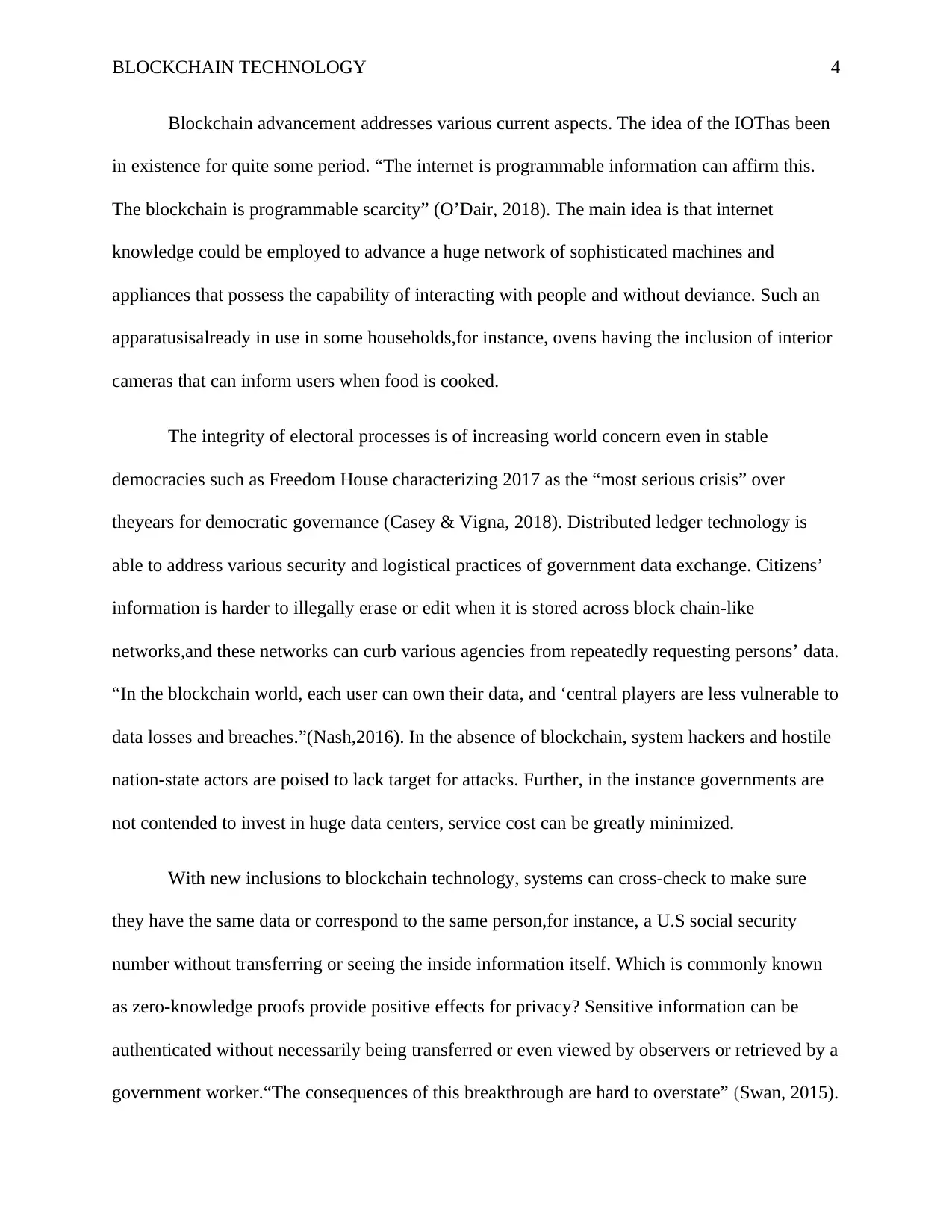
BLOCKCHAIN TECHNOLOGY 4
Blockchain advancement addresses various current aspects. The idea of the IOThas been
in existence for quite some period. “The internet is programmable information can affirm this.
The blockchain is programmable scarcity” (O’Dair, 2018). The main idea is that internet
knowledge could be employed to advance a huge network of sophisticated machines and
appliances that possess the capability of interacting with people and without deviance. Such an
apparatusisalready in use in some households,for instance, ovens having the inclusion of interior
cameras that can inform users when food is cooked.
The integrity of electoral processes is of increasing world concern even in stable
democracies such as Freedom House characterizing 2017 as the “most serious crisis” over
theyears for democratic governance (Casey & Vigna, 2018). Distributed ledger technology is
able to address various security and logistical practices of government data exchange. Citizens’
information is harder to illegally erase or edit when it is stored across block chain-like
networks,and these networks can curb various agencies from repeatedly requesting persons’ data.
“In the blockchain world, each user can own their data, and ‘central players are less vulnerable to
data losses and breaches.”(Nash,2016). In the absence of blockchain, system hackers and hostile
nation-state actors are poised to lack target for attacks. Further, in the instance governments are
not contended to invest in huge data centers, service cost can be greatly minimized.
With new inclusions to blockchain technology, systems can cross-check to make sure
they have the same data or correspond to the same person,for instance, a U.S social security
number without transferring or seeing the inside information itself. Which is commonly known
as zero-knowledge proofs provide positive effects for privacy? Sensitive information can be
authenticated without necessarily being transferred or even viewed by observers or retrieved by a
government worker.“The consequences of this breakthrough are hard to overstate” (Swan, 2015).
Blockchain advancement addresses various current aspects. The idea of the IOThas been
in existence for quite some period. “The internet is programmable information can affirm this.
The blockchain is programmable scarcity” (O’Dair, 2018). The main idea is that internet
knowledge could be employed to advance a huge network of sophisticated machines and
appliances that possess the capability of interacting with people and without deviance. Such an
apparatusisalready in use in some households,for instance, ovens having the inclusion of interior
cameras that can inform users when food is cooked.
The integrity of electoral processes is of increasing world concern even in stable
democracies such as Freedom House characterizing 2017 as the “most serious crisis” over
theyears for democratic governance (Casey & Vigna, 2018). Distributed ledger technology is
able to address various security and logistical practices of government data exchange. Citizens’
information is harder to illegally erase or edit when it is stored across block chain-like
networks,and these networks can curb various agencies from repeatedly requesting persons’ data.
“In the blockchain world, each user can own their data, and ‘central players are less vulnerable to
data losses and breaches.”(Nash,2016). In the absence of blockchain, system hackers and hostile
nation-state actors are poised to lack target for attacks. Further, in the instance governments are
not contended to invest in huge data centers, service cost can be greatly minimized.
With new inclusions to blockchain technology, systems can cross-check to make sure
they have the same data or correspond to the same person,for instance, a U.S social security
number without transferring or seeing the inside information itself. Which is commonly known
as zero-knowledge proofs provide positive effects for privacy? Sensitive information can be
authenticated without necessarily being transferred or even viewed by observers or retrieved by a
government worker.“The consequences of this breakthrough are hard to overstate” (Swan, 2015).
Paraphrase This Document
Need a fresh take? Get an instant paraphrase of this document with our AI Paraphraser
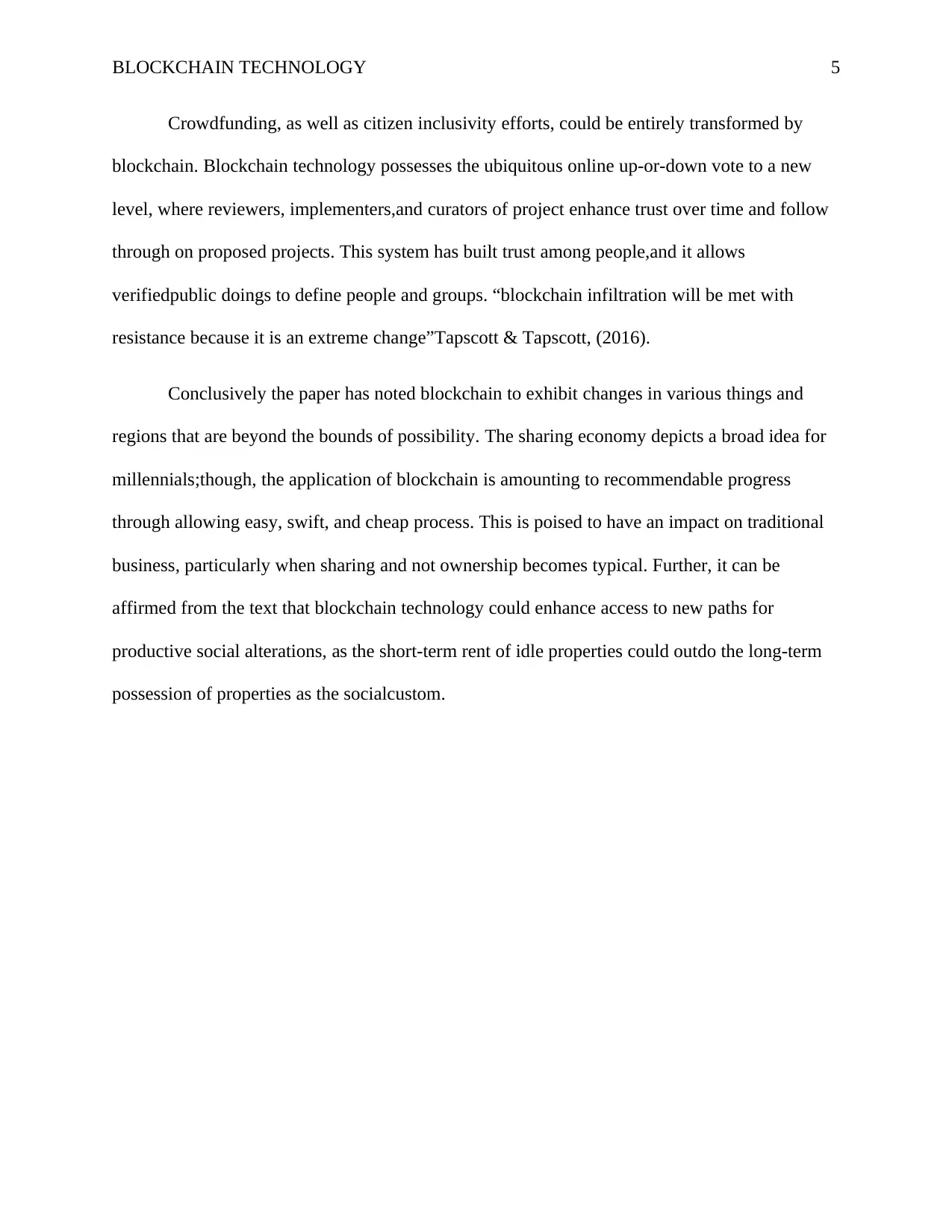
BLOCKCHAIN TECHNOLOGY 5
Crowdfunding, as well as citizen inclusivity efforts, could be entirely transformed by
blockchain. Blockchain technology possesses the ubiquitous online up-or-down vote to a new
level, where reviewers, implementers,and curators of project enhance trust over time and follow
through on proposed projects. This system has built trust among people,and it allows
verifiedpublic doings to define people and groups. “blockchain infiltration will be met with
resistance because it is an extreme change”Tapscott & Tapscott, (2016).
Conclusively the paper has noted blockchain to exhibit changes in various things and
regions that are beyond the bounds of possibility. The sharing economy depicts a broad idea for
millennials;though, the application of blockchain is amounting to recommendable progress
through allowing easy, swift, and cheap process. This is poised to have an impact on traditional
business, particularly when sharing and not ownership becomes typical. Further, it can be
affirmed from the text that blockchain technology could enhance access to new paths for
productive social alterations, as the short-term rent of idle properties could outdo the long-term
possession of properties as the socialcustom.
Crowdfunding, as well as citizen inclusivity efforts, could be entirely transformed by
blockchain. Blockchain technology possesses the ubiquitous online up-or-down vote to a new
level, where reviewers, implementers,and curators of project enhance trust over time and follow
through on proposed projects. This system has built trust among people,and it allows
verifiedpublic doings to define people and groups. “blockchain infiltration will be met with
resistance because it is an extreme change”Tapscott & Tapscott, (2016).
Conclusively the paper has noted blockchain to exhibit changes in various things and
regions that are beyond the bounds of possibility. The sharing economy depicts a broad idea for
millennials;though, the application of blockchain is amounting to recommendable progress
through allowing easy, swift, and cheap process. This is poised to have an impact on traditional
business, particularly when sharing and not ownership becomes typical. Further, it can be
affirmed from the text that blockchain technology could enhance access to new paths for
productive social alterations, as the short-term rent of idle properties could outdo the long-term
possession of properties as the socialcustom.
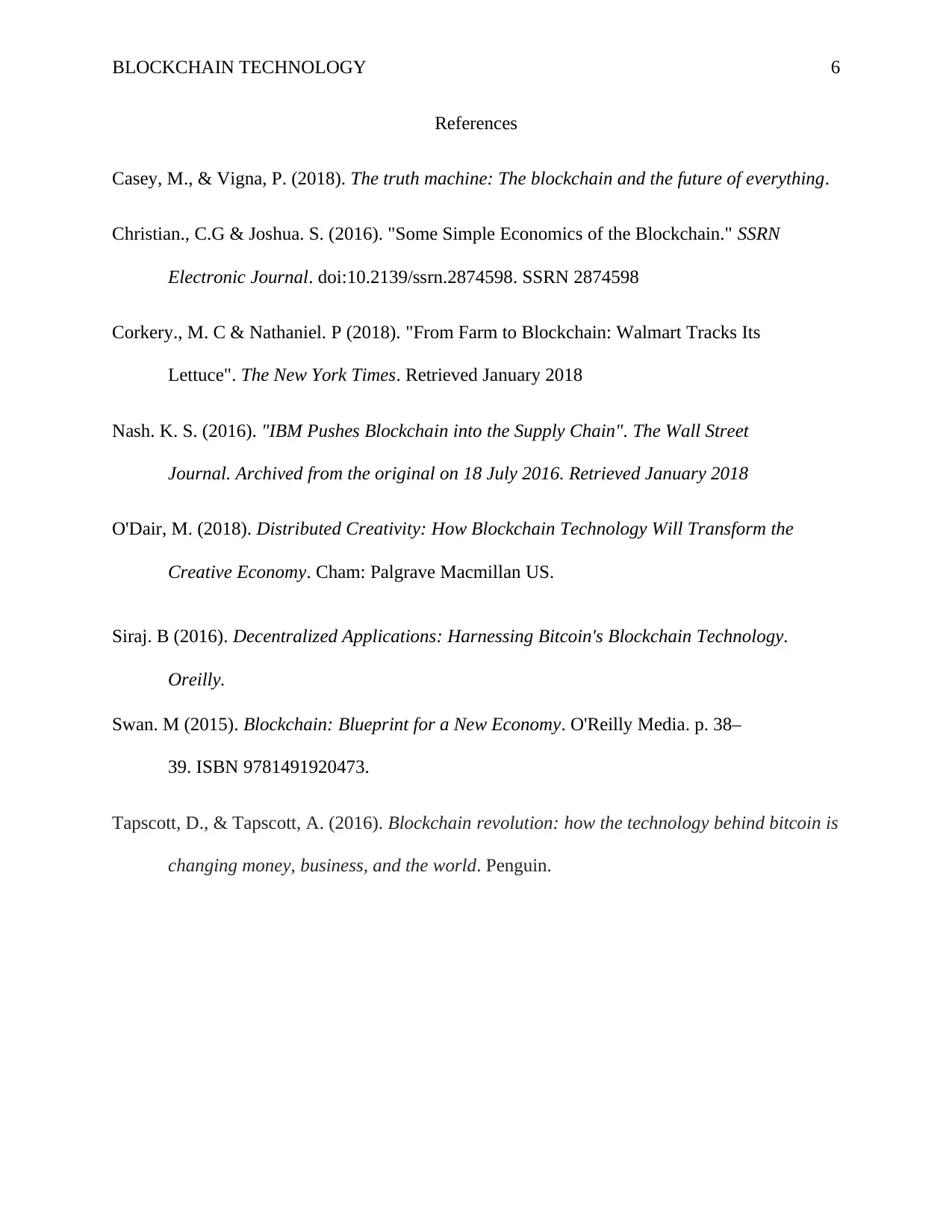
BLOCKCHAIN TECHNOLOGY 6
References
Casey, M., & Vigna, P. (2018). The truth machine: The blockchain and the future of everything.
Christian., C.G & Joshua. S. (2016). "Some Simple Economics of the Blockchain." SSRN
Electronic Journal. doi:10.2139/ssrn.2874598. SSRN 2874598
Corkery., M. C & Nathaniel. P (2018). "From Farm to Blockchain: Walmart Tracks Its
Lettuce". The New York Times. Retrieved January 2018
Nash. K. S. (2016). "IBM Pushes Blockchain into the Supply Chain". The Wall Street
Journal. Archived from the original on 18 July 2016. Retrieved January 2018
O'Dair, M. (2018). Distributed Creativity: How Blockchain Technology Will Transform the
Creative Economy. Cham: Palgrave Macmillan US.
Siraj. B (2016). Decentralized Applications: Harnessing Bitcoin's Blockchain Technology.
Oreilly.
Swan. M (2015). Blockchain: Blueprint for a New Economy. O'Reilly Media. p. 38–
39. ISBN 9781491920473.
Tapscott, D., & Tapscott, A. (2016). Blockchain revolution: how the technology behind bitcoin is
changing money, business, and the world. Penguin.
References
Casey, M., & Vigna, P. (2018). The truth machine: The blockchain and the future of everything.
Christian., C.G & Joshua. S. (2016). "Some Simple Economics of the Blockchain." SSRN
Electronic Journal. doi:10.2139/ssrn.2874598. SSRN 2874598
Corkery., M. C & Nathaniel. P (2018). "From Farm to Blockchain: Walmart Tracks Its
Lettuce". The New York Times. Retrieved January 2018
Nash. K. S. (2016). "IBM Pushes Blockchain into the Supply Chain". The Wall Street
Journal. Archived from the original on 18 July 2016. Retrieved January 2018
O'Dair, M. (2018). Distributed Creativity: How Blockchain Technology Will Transform the
Creative Economy. Cham: Palgrave Macmillan US.
Siraj. B (2016). Decentralized Applications: Harnessing Bitcoin's Blockchain Technology.
Oreilly.
Swan. M (2015). Blockchain: Blueprint for a New Economy. O'Reilly Media. p. 38–
39. ISBN 9781491920473.
Tapscott, D., & Tapscott, A. (2016). Blockchain revolution: how the technology behind bitcoin is
changing money, business, and the world. Penguin.
⊘ This is a preview!⊘
Do you want full access?
Subscribe today to unlock all pages.

Trusted by 1+ million students worldwide
1 out of 6
Your All-in-One AI-Powered Toolkit for Academic Success.
+13062052269
info@desklib.com
Available 24*7 on WhatsApp / Email
![[object Object]](/_next/static/media/star-bottom.7253800d.svg)
Unlock your academic potential
Copyright © 2020–2026 A2Z Services. All Rights Reserved. Developed and managed by ZUCOL.